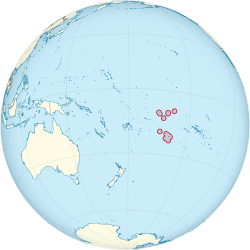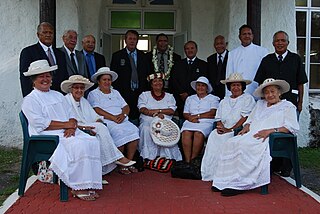A request that this article title be changed to Index of Cook Islands–related articles is under discussion. Please do not move this article until the discussion is closed. |

This page contains a list topics related to the Cook Islands :
A request that this article title be changed to Index of Cook Islands–related articles is under discussion. Please do not move this article until the discussion is closed. |

This page contains a list topics related to the Cook Islands :
This section is empty.You can help by adding to it.(July 2010) |
This section is empty.You can help by adding to it.(July 2010) |
This section is empty.You can help by adding to it.(July 2010) |
This section is empty.You can help by adding to it.(July 2010) |
This section is empty.You can help by adding to it.(July 2010) |
This section is empty.You can help by adding to it.(July 2010) |
This section is empty.You can help by adding to it.(July 2010) |
This section is empty.You can help by adding to it.(July 2010) |
This section is empty.You can help by adding to it.(July 2010) |
This section is empty.You can help by adding to it.(July 2010) |
This section is empty.You can help by adding to it.(July 2010) |
This section is empty.You can help by adding to it.(July 2010) |
This section is empty.You can help by adding to it.(July 2010) |

The Cook Islands is a self-governing island country in the South Pacific Ocean in free association with New Zealand. It comprises 15 islands whose total land area is 240 square kilometres (93 sq mi). The Cook Islands' Exclusive Economic Zone (EEZ) covers 1,960,027 square kilometres (756,771 sq mi) of ocean.

The Cook Islands are named after Captain James Cook, who visited the islands in 1773 and 1777. The Cook Islands became a British protectorate in 1888.

Rarotonga is the most populous of the Cook Islands, with a population of 10,649, out of the country's total resident population of 14,802. Captain John Dibbs, master of the colonial brig Endeavour, is credited as the European discoverer on 25 July 1823, while transporting the missionary Reverend John Williams.

A marae, malaʻe, meʻae or malae is a communal or sacred place that serves religious and social purposes in Polynesian societies. In all these languages, the term also means cleared, free of weeds, trees. Marae generally consist of an area of cleared land roughly rectangular, bordered with stones or wooden posts perhaps with paepae (terraces) which were traditionally used for ceremonial purposes; and in some cases, a central stone ahu or a'u. In the Rapa Nui culture of Easter Island, the term ahu has become a synonym for the whole marae complex.

Avarua is a town and district in the north of the island of Rarotonga, and is the national capital of the Cook Islands.
Cook Islands Māori is an Eastern Polynesian language that is the official language of the Cook Islands. Cook Islands Māori is closely related to New Zealand Māori, but is a distinct language in its own right. Cook Islands Māori is simply called Māori when there is no need to disambiguate it from New Zealand Māori, but it is also known as Māori Kūki 'Āirani, or, controversially, Rarotongan. Many Cook Islanders also call it Te reo Ipukarea, literally "the language of the Ancestral Homeland".

Rarotonga International Airport is the Cook Islands' main international gateway, located in the town and district of Avarua, Rarotonga, 3 km west of the downtown area on the northern coast.

Albert Royle Henry was the first Premier of the Cook Islands. He was forced to resign from that post in a 1978 voting scandal for which he was later convicted of fraud. Henry was the founder and first leader of the Cook Islands Party (CIP).

The Roman Catholic Diocese of Rarotonga in the Cook Islands is a suffragan diocese of the Roman Catholic Archdiocese of Suva in neighbouring Fiji. It was erected as the Prefecture Apostolic of Cook e Mnihiki in 1922, elevated to the Vicariate Apostolic of Cook Islands in 1948 and elevated as the Diocese of Rarotonga in 1966.

The Kingdom of Rarotonga, named after the island of Rarotonga, was an independent kingdom established in the present-day Cook Islands in 1858. In 1888 it became a protectorate of the United Kingdom by its own request. In 1893 the name was changed to the Cook Islands Federation.
Nukutere College is a Roman Catholic secondary school located in Avarua, Rarotonga, Cook Islands. It is the country’s only Catholic secondary school and has an important educational role across the archipelago. "Nukutere" means "people on a journey", a reference to the pilgrim Church in the South Pacific context.

The House of Ariki is a parliamentary body in the Cook Islands. It is composed of Cook Islands high chiefs (ariki), appointed by the Queen's Representative. There are up to twenty-four members, representing different islands of the Cooks.

The following outline is provided as an overview of and topical guide to the Cook Islands:
Ronald Gordon Crocombe was a Professor of Pacific Studies at the University of the South Pacific. His reputation was such that he was described as the "father of Pacific Studies".

Paul Donoghue SM is the sixth Catholic Bishop of Rarotonga (2011–present) in the Cook Islands. He was appointed bishop by Pope Benedict XVI on 11 April 2011.

This is a survey of the postage stamps and postal history of the Cook Islands.
Athletics competitions at the 2009 Pacific Mini Games were held at the Bank of the Cook Islands National Stadium in Rarotonga, Cook Islands, between September 22–26, 2009.
The Miss Cook Islands is the national beauty pageant in the Cook Islands in under Miss Cook Islands Association (MCIA). The current reigning titleholder is Tajiya Sahay who was crowned in October 2019.

The 2014 Oceania Athletics Championships were held at the BCI Stadium in Avarua, Rarotonga, Cook Islands, between June 24–26, 2014. The event was held jointly with the 2014 Oceania Junior Athletics Championships, and there were also exhibition events for masters, and athletes with a disability (parasports). Detailed reports on a day by day basis were given.
St. Joseph's Cathedral is the cathedral of the Bishop of Rarotonga and is located in Avarua in the north of the island of Rarotonga the largest and most populated island of the Cook Islands a self-governing island country in the South Pacific Ocean in free association with New Zealand